Court sides with Norwegian regulator's $100K daily fine imposed on Meta over ad privacy concerns
Meta has lost a legal battle to freeze an order from Norway’s data protection authority that imposes hefty fines on the Facebook and Instagram owner over advertising practices deemed to violate user privacy

NEW YORK (AP) — Meta lost a legal battle Wednesday to halt a Norwegian ban on its advertising practices that came with hefty daily fines, in a blow to the U.S. social media giant’s business model.
Suggested Reading
Norwegian regulator Datatilsynet in July announced a “temporary ban” on Facebook and Instagram’s behavioral advertising — a common marketing practice that tech giants like Meta use at the heart of their business models to sell targeted ads based on user data ranging from personal interests to places they’ve been.
Related Content
Such practices without adequate consent violate user privacy and are illegal, Datatilsynet said, adding that the ban was set to last for three months or until Meta complies with the law.
During the ban, which began last month, Instagram and Facebook can continue to operate normally in Norway — but if they do, Meta faces a “coercive fine” of up to 1 million Norwegian kroner (nearly $100,000) each day. In efforts to challenge this, Meta applied for a temporary injunction — arguing that the Datatilsynet did not have legal grounds for its urgent decision, citing factors including inadequate notice.
But on Wednesday, Oslo District Court sided with the privacy watchdog. The ruling confirms the ban's daily fine became applicable on Aug. 14 and continues to add up.
“We are very pleased with the Court’s ruling and the result. This is a big victory for people’s data protection rights,” Datatilsynet director general Line Coll said in a statement.
Meanwhile, a Meta spokesperson said that the company was “disappointed” by the decision “and will now consider our next steps.” The spokesperson added that the Menlo Park, California-based company already announced plans to shift all users in the European Economic Area to consent law under the European Union's General Data Protection Regulation.
A behavioral advertising ban beyond Norway, which isn't in the EU but part of the European Economic Area, is possible. Datatilsynet says it may take the matter to the European Data Protection Board, the top panel of privacy regulators, which could extend the ban and lead to wider implications across the continent.
Meta has been under fire over data privacy for some time. In May, for example, the EU slapped Meta with a record $1.3 billion fine and ordered it to stop transferring users’ personal information across the Atlantic by October. And the tech giant’s new text-based app, Threads, has not rolled out in the EU due to regulatory concerns.
Meta is also among the companies that the EU is targeting under new digital rules aimed at reining in the market power of tech giants. In addition to the Facebook owner, Apple, Amazon, Microsoft, Google parent Alphabet and TikTok parent ByteDance were classified Wednesday as online “gatekeepers” that must face the highest level of scrutiny under the 27-nation bloc’s Digital Markets Act.
_____________
AP Technology Writer Kelvin Chan contributed to this report from London.
